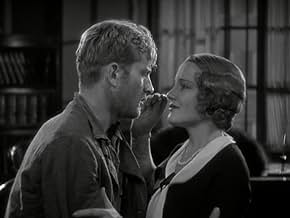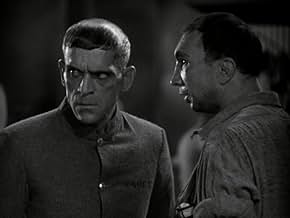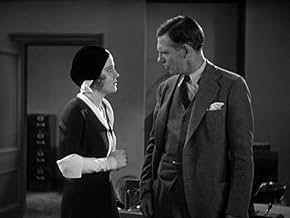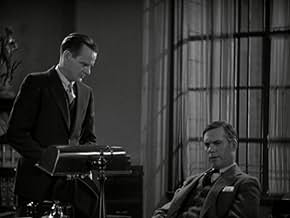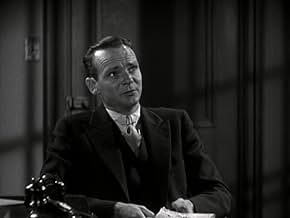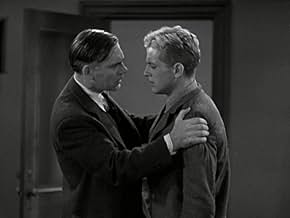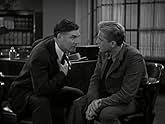IMDb रेटिंग
6.9/10
1.5 हज़ार
आपकी रेटिंग
अपनी भाषा में प्लॉट जोड़ेंAfter a failed attempt at running for governor, D.A. Mark Brady is appointed warden of the state prison where many of the criminals he prosecuted are incarcerated.After a failed attempt at running for governor, D.A. Mark Brady is appointed warden of the state prison where many of the criminals he prosecuted are incarcerated.After a failed attempt at running for governor, D.A. Mark Brady is appointed warden of the state prison where many of the criminals he prosecuted are incarcerated.
- निर्देशक
- लेखक
- स्टार
- 1 ऑस्कर के लिए नामांकित
- 3 जीत और कुल 1 नामांकन
DeWitt Jennings
- Captain Gleason
- (as De Witt Jennings)
Paul Porcasi
- Tony Spelvin
- (as Paul Porcassi)
Richard Bishop
- Minor Role
- (बिना क्रेडिट के)
Andy Devine
- Cluck - a Convict with knife
- (बिना क्रेडिट के)
James Guilfoyle
- Detective Doran
- (बिना क्रेडिट के)
Frank Hagney
- Prison Guard in Yard
- (अपुष्टिकृत)
- (बिना क्रेडिट के)
फ़ीचर्ड समीक्षाएं
"The Criminal Code" is centered around the theme "An Eye for An Eye." This theme is the reason that young Robert Graham is sent to prison, the reason why the prisoners object to the D.A. becoming the Warden of the prison, and the reason why Graham is sent to "the hole" near the end of the film. For 1931, it was one of the first critical looks at this theme. It raises certain questions as to the morals of the law, and the Criminal Code versus the Prisoners Code. Phillips Holmes gives a good enough performance as Robert Graham, and Boris Karloff came off well as the inmate with a bone to pick (months before becoming Frankenstein), but the performance that I liked the most was Walter Huston, who played the D.A.-turned-prison-warden. Huston's character was a wily one, who said "Yeah" and "Yeah?" about a hundred times throughout the film.
DA Brady sends young Graham to prison unjustly, and must redeem himself once he becomes the prison's warden.
The credits indicate icon Howard Hawks as the director; IMDb uncharacteristically lists no one; while Hawks' bio-site states he's the uncredited helmsman. I include this rather puzzling movie pedigree because I see very little of Hawks' characteristic style on screen. He may well have been adjusting to the new factor of sound (as others point out), but whatever the reason, the screenplay could have been filmed by any number of solid Hollywood craftsmen.
The movie itself has been made several times over, so the material is familiar. But except for Huston's dynamic performance and Karloff's formidable presence, there's not much to recommend beyond the story itself. The prison yard scenes are riveting with their marching phalanxes of inmates. Sort of like a non-musical Busby Berkeley. I also like that early scene where DA Brady (Huston) strips away shady lady Gertie's thin façade of respectability. To me, its spirited air bespeaks Hawks' guiding hand, as does Brady's surprisingly intense grilling of Graham. However, what should be a highlight, Ned's (Karloff) revenge killing of the squealer, is unnecessarily down-played for this pre-Code period.
Note how we're led to respect the inmates' code of conduct even though they are convicted criminals. Both the law and the inmates have their respective codes, but more importantly, the codes may well be linked by a common sense of justice. When, for example, those codes are broken by the squealer, on one hand, and by head guard Gleason, on the other, we're led to sympathize with the respective acts of retribution, bloody though they undoubtedly are. And since both acts are carried out by the hulking Ned, he becomes something of an avenging angel despite his gruesome appearance. It's the ambiguities of the two codes, united, perhaps, by a common sense of justice that suggests an interesting subtext to the story.
Anyway, in my little book, this is a Walter Huston showcase, proving again that an actor of less than handsome appearance could carry a Hollywood movie.
The credits indicate icon Howard Hawks as the director; IMDb uncharacteristically lists no one; while Hawks' bio-site states he's the uncredited helmsman. I include this rather puzzling movie pedigree because I see very little of Hawks' characteristic style on screen. He may well have been adjusting to the new factor of sound (as others point out), but whatever the reason, the screenplay could have been filmed by any number of solid Hollywood craftsmen.
The movie itself has been made several times over, so the material is familiar. But except for Huston's dynamic performance and Karloff's formidable presence, there's not much to recommend beyond the story itself. The prison yard scenes are riveting with their marching phalanxes of inmates. Sort of like a non-musical Busby Berkeley. I also like that early scene where DA Brady (Huston) strips away shady lady Gertie's thin façade of respectability. To me, its spirited air bespeaks Hawks' guiding hand, as does Brady's surprisingly intense grilling of Graham. However, what should be a highlight, Ned's (Karloff) revenge killing of the squealer, is unnecessarily down-played for this pre-Code period.
Note how we're led to respect the inmates' code of conduct even though they are convicted criminals. Both the law and the inmates have their respective codes, but more importantly, the codes may well be linked by a common sense of justice. When, for example, those codes are broken by the squealer, on one hand, and by head guard Gleason, on the other, we're led to sympathize with the respective acts of retribution, bloody though they undoubtedly are. And since both acts are carried out by the hulking Ned, he becomes something of an avenging angel despite his gruesome appearance. It's the ambiguities of the two codes, united, perhaps, by a common sense of justice that suggests an interesting subtext to the story.
Anyway, in my little book, this is a Walter Huston showcase, proving again that an actor of less than handsome appearance could carry a Hollywood movie.
10whpratt1
Boris Karloff appeared on the stage of the Belasco Theatre, New York City in the role of Galloway in a Martin Flavin stage play. It was a minor part, however, it was an important one: Galloway, the prison trusty who becomes a killer. On the strength of his performance, he was soon cast in the film version. During 1931-32, twenty-three of his films were released, an average of nearly one a month which included Frankenstein. Criminal Code was the big break Karloff was waiting for and he never gave up acting until the very end.
I was with this movie until the end. A hard look at the ironic effect the criminal justice system can have on men caught up in it through happenstance, it suddenly gives our characters an easy way out instead of taking the story to the darker places it probably needed to go. Up until those final minutes, Hawks' The Criminal Code was a solidly told tale, but it simply cannot follow through on the promise of its first 90 minutes.
Walter Huston plays Mark Brady, the district attorney in an unspecified city, who is tasked with the job of prosecuting Phillips Holmes' Robert Graham, a young man new to town who had a bit too much (illegal) gin at a nightclub and killed a man pawing his date by hitting him over the head with a water bottle. Brady talks to his assistant about how, if he were the boy's defense, he could get it so that the boy wouldn't serve a day I prison, but as district attorney he fights as hard as he can to get as punitive a sentence as possible which ends up being ten years.
Six years go by. Graham has whittled away the years working in one of the jail's manufacturing plants, and Brady has gone on to run unsuccessfully as governor of the state. Brady takes the job as prison warden at Graham's prison in a post electoral loss move. He's there to do his best in the job, to mete out justice where he can. He's a good public servant, and he's going to do his best to run the prison as best he can. All of this takes about half an hour to set up, and it's a quality thirty minutes of character-based storytelling that gets all of our pieces together.
Brady makes an impression on the inmate population by breaking up their unified protest of his presence (having put about a thousand of the inmates there himself, according to one estimate) by simply walking through the population unarmed and unguarded in the yard. His machismo impresses them into silence. Shortly afterwards, Graham collapses from the fumes, heat, and pressure of his job, and the prison doctor recommends a change of work to something easier. Brady, having had some level of sympathy for Graham ever since his district attorney days, allows Graham to enter his household as a servant, attending his car and Brady's daughter, Mary.
Graham, being a good guy, falls for Mary and Mary falls for him, but the romance is never central or overwrought. It's balanced just right so that we can see and understand the budding feelings without it entering melodrama. So much of the movie is handled so well, I say.
The plot that ends up developing is around a squealing inmate who accidentally gave away the game on an escape attempt that involved Graham's cellmate, leading to the cellmate getting shot. Not only did this stool pigeon foul up an escape, he got an inmate killed. He now has a target on his back, and Brady knows it. Brady keeps him in his office for protection, and we get an incredibly great sequence where Graham's other cellmate, Galloway (played really well by Boris Karloff), who is also a servant in the warden's quarters, sneaks into Brady's office in the middle of a prison wide jeer session, and kills the stool pigeon. Scored only with the sound of a thousand men calling out at once over and over again, it's a tense sequence that would have made Hitchcock proud.
I was ready to love this movie in the end, but then the ending started and I could feel my enthusiasm waning instantly. There are a complex set of pieces to put in place involving Graham in solitary confinement because he won't give up the killer, Galloway trying to get down to solitary to kill the captain of the guard with whom he has a personal grudge before, he thinks, Graham will do it himself, a knife hidden in Graham's food, and a pistol. As this was all rolling out, I just knew where it was going to end.
The movie has an almost literary feel (not entirely unsurprising considering it was adapted from a play) where so much gets a double meaning, and that starts with the film's title. At the beginning, it's emphasized that Brady calls the Criminal Code of the city his Bible, but by the end the criminal code is the code by which criminals in prison live by, dictating Graham's silence even though he knows that Galloway killed the stool pigeon. There are repeated lines from the beginning of the movie that get repeated in completely oppositional context in the later parts of the movie. This is really strong stuff that never gets highlighted. You need to pay attention to pick it all up, but it's there. What the movie is doing is showing the deleterious effects of over-enthusiastic sentencing on men and how the pursuit of justice, even nobly done, can go too far to destroy people. Graham is the center of all this, and he's caught between loyalties, to the law and to his comrades in prison, and then the movie gives him an out.
Galloway goes down, takes a guard's gun, hides Graham's knife in his coat, and, after a quick standoff, surrenders himself to the captain of the guard only to take him prisoner and then admit to the warden that he killed the stool pigeon. Well, there goes Graham's moral quandary, saved by Galloway's tangential vengeance. The pieces that go into Galloway getting his vengeance and saving Graham's hide are exceptionally well made, though. Galloway is introduced early, as well as his antipathy against the captain of the guard. The knife, the solitary confinement, and all of the pieces coming together work exceptionally well, but they undermine the movie's central point completely, undercutting a serious look at the contemporary prison system that may have no easy answers and giving us an easy dramatic out for the audience to hang onto. I wonder if this is a result of the nascent Hays Codes, which weren't really enforced vociferously until 1934, but this ending just doesn't fit.
And that's unfortunate. The movie that precedes that ending is the work of something perhaps special, definitely solid. The ending kind of ruins it, but only kind of. The great murder scene is still there. The solid character work throughout is still there. The good performances from everyone involved (especially Boris Karloff) remain. It just doesn't come to the right place in the end.
Walter Huston plays Mark Brady, the district attorney in an unspecified city, who is tasked with the job of prosecuting Phillips Holmes' Robert Graham, a young man new to town who had a bit too much (illegal) gin at a nightclub and killed a man pawing his date by hitting him over the head with a water bottle. Brady talks to his assistant about how, if he were the boy's defense, he could get it so that the boy wouldn't serve a day I prison, but as district attorney he fights as hard as he can to get as punitive a sentence as possible which ends up being ten years.
Six years go by. Graham has whittled away the years working in one of the jail's manufacturing plants, and Brady has gone on to run unsuccessfully as governor of the state. Brady takes the job as prison warden at Graham's prison in a post electoral loss move. He's there to do his best in the job, to mete out justice where he can. He's a good public servant, and he's going to do his best to run the prison as best he can. All of this takes about half an hour to set up, and it's a quality thirty minutes of character-based storytelling that gets all of our pieces together.
Brady makes an impression on the inmate population by breaking up their unified protest of his presence (having put about a thousand of the inmates there himself, according to one estimate) by simply walking through the population unarmed and unguarded in the yard. His machismo impresses them into silence. Shortly afterwards, Graham collapses from the fumes, heat, and pressure of his job, and the prison doctor recommends a change of work to something easier. Brady, having had some level of sympathy for Graham ever since his district attorney days, allows Graham to enter his household as a servant, attending his car and Brady's daughter, Mary.
Graham, being a good guy, falls for Mary and Mary falls for him, but the romance is never central or overwrought. It's balanced just right so that we can see and understand the budding feelings without it entering melodrama. So much of the movie is handled so well, I say.
The plot that ends up developing is around a squealing inmate who accidentally gave away the game on an escape attempt that involved Graham's cellmate, leading to the cellmate getting shot. Not only did this stool pigeon foul up an escape, he got an inmate killed. He now has a target on his back, and Brady knows it. Brady keeps him in his office for protection, and we get an incredibly great sequence where Graham's other cellmate, Galloway (played really well by Boris Karloff), who is also a servant in the warden's quarters, sneaks into Brady's office in the middle of a prison wide jeer session, and kills the stool pigeon. Scored only with the sound of a thousand men calling out at once over and over again, it's a tense sequence that would have made Hitchcock proud.
I was ready to love this movie in the end, but then the ending started and I could feel my enthusiasm waning instantly. There are a complex set of pieces to put in place involving Graham in solitary confinement because he won't give up the killer, Galloway trying to get down to solitary to kill the captain of the guard with whom he has a personal grudge before, he thinks, Graham will do it himself, a knife hidden in Graham's food, and a pistol. As this was all rolling out, I just knew where it was going to end.
The movie has an almost literary feel (not entirely unsurprising considering it was adapted from a play) where so much gets a double meaning, and that starts with the film's title. At the beginning, it's emphasized that Brady calls the Criminal Code of the city his Bible, but by the end the criminal code is the code by which criminals in prison live by, dictating Graham's silence even though he knows that Galloway killed the stool pigeon. There are repeated lines from the beginning of the movie that get repeated in completely oppositional context in the later parts of the movie. This is really strong stuff that never gets highlighted. You need to pay attention to pick it all up, but it's there. What the movie is doing is showing the deleterious effects of over-enthusiastic sentencing on men and how the pursuit of justice, even nobly done, can go too far to destroy people. Graham is the center of all this, and he's caught between loyalties, to the law and to his comrades in prison, and then the movie gives him an out.
Galloway goes down, takes a guard's gun, hides Graham's knife in his coat, and, after a quick standoff, surrenders himself to the captain of the guard only to take him prisoner and then admit to the warden that he killed the stool pigeon. Well, there goes Graham's moral quandary, saved by Galloway's tangential vengeance. The pieces that go into Galloway getting his vengeance and saving Graham's hide are exceptionally well made, though. Galloway is introduced early, as well as his antipathy against the captain of the guard. The knife, the solitary confinement, and all of the pieces coming together work exceptionally well, but they undermine the movie's central point completely, undercutting a serious look at the contemporary prison system that may have no easy answers and giving us an easy dramatic out for the audience to hang onto. I wonder if this is a result of the nascent Hays Codes, which weren't really enforced vociferously until 1934, but this ending just doesn't fit.
And that's unfortunate. The movie that precedes that ending is the work of something perhaps special, definitely solid. The ending kind of ruins it, but only kind of. The great murder scene is still there. The solid character work throughout is still there. The good performances from everyone involved (especially Boris Karloff) remain. It just doesn't come to the right place in the end.
In The Criminal Code the bywords of District Attorney Walter Huston is that where there is a crime, someone has to pay. Or if you can't do the time, don't do the crime as a later philosopher named Tony Baretta opined. And it's Huston's job to set the price when he prosecutes.
But Huston recognizes that young Phillips Holmes with a proper criminal defense attorney might do little time or even be acquitted. He smashed some poor guy's head in with a full bottle of bootleg hooch when he thought he was going for a gun. Still Holmes is convicted and he gets a ten year sentence.
Fast forward several years and Huston is no longer the District Attorney, he's now the warden of the prison that Holmes is incarcerated. Huston gives Holmes a chance and he makes him a trustee. Huston's daughter Constance Cummings even falls for Holmes.
But they have a different code among the convicts in prison and the biggest commandment is thou shalt not rat. When Boris Karloff does a particular rat in Holmes almost takes the fall for it because of that code.
The leads do a fine job in this, but the performances of Boris Karloff as the hardened convict and Clark Marshall as his victim really do stand out in The Criminal Code. Marshall especially, you can really feel his fear in his performance.
Beginning originally as a Broadway play, The Criminal Code was remade twice by Columbia Pictures, Harry Cohn not being one to let a good property go to waste. The two remakes are Penitentiary with Walter Connolly and John Howard and Convicted with Broderick Crawford and Glenn Ford.
The film holds up very well because the themes are eternal. Criminals have to pay the price when caught and rats are just as unpopular as ever.
But Huston recognizes that young Phillips Holmes with a proper criminal defense attorney might do little time or even be acquitted. He smashed some poor guy's head in with a full bottle of bootleg hooch when he thought he was going for a gun. Still Holmes is convicted and he gets a ten year sentence.
Fast forward several years and Huston is no longer the District Attorney, he's now the warden of the prison that Holmes is incarcerated. Huston gives Holmes a chance and he makes him a trustee. Huston's daughter Constance Cummings even falls for Holmes.
But they have a different code among the convicts in prison and the biggest commandment is thou shalt not rat. When Boris Karloff does a particular rat in Holmes almost takes the fall for it because of that code.
The leads do a fine job in this, but the performances of Boris Karloff as the hardened convict and Clark Marshall as his victim really do stand out in The Criminal Code. Marshall especially, you can really feel his fear in his performance.
Beginning originally as a Broadway play, The Criminal Code was remade twice by Columbia Pictures, Harry Cohn not being one to let a good property go to waste. The two remakes are Penitentiary with Walter Connolly and John Howard and Convicted with Broderick Crawford and Glenn Ford.
The film holds up very well because the themes are eternal. Criminals have to pay the price when caught and rats are just as unpopular as ever.
क्या आपको पता है
- ट्रिवियाThe prison yard sequence was shot at M-G-M, using the set originally built for "The Big House" (1930).
- गूफ़Paul Porcasi's name is spelled "Porcassi" in the opening credits.
- भाव
Mark Brady: [to Graham] Tough luck, Bob, but that's the way they break sometimes. You got to take them the way they fall.
- क्रेज़ी क्रेडिटThe film's credits do not say that Howard Hawks directed the film; instead, they say that the film is "A Howard Hawks Production."
- कनेक्शनAlternate-language version of El código penal (1931)
टॉप पसंद
रेटिंग देने के लिए साइन-इन करें और वैयक्तिकृत सुझावों के लिए वॉचलिस्ट करें
- How long is The Criminal Code?Alexa द्वारा संचालित
विवरण
- चलने की अवधि1 घंटा 37 मिनट
- रंग
इस पेज में योगदान दें
किसी बदलाव का सुझाव दें या अनुपलब्ध कॉन्टेंट जोड़ें


